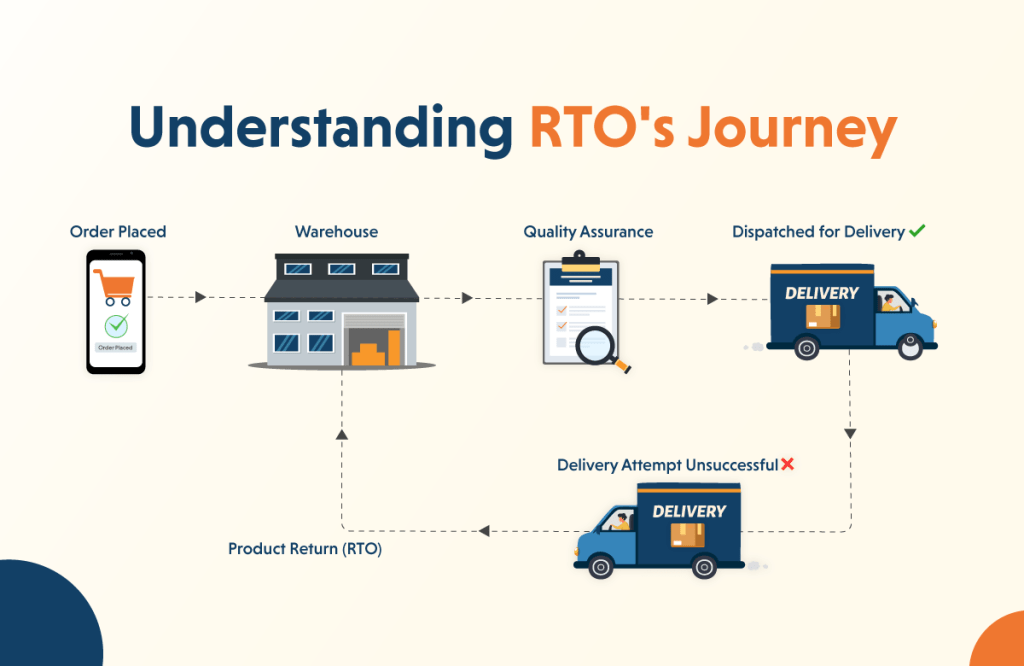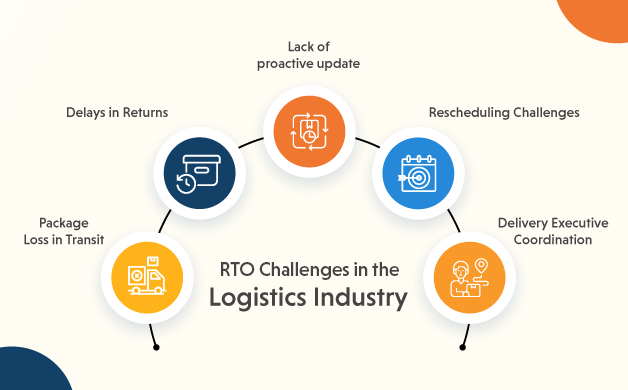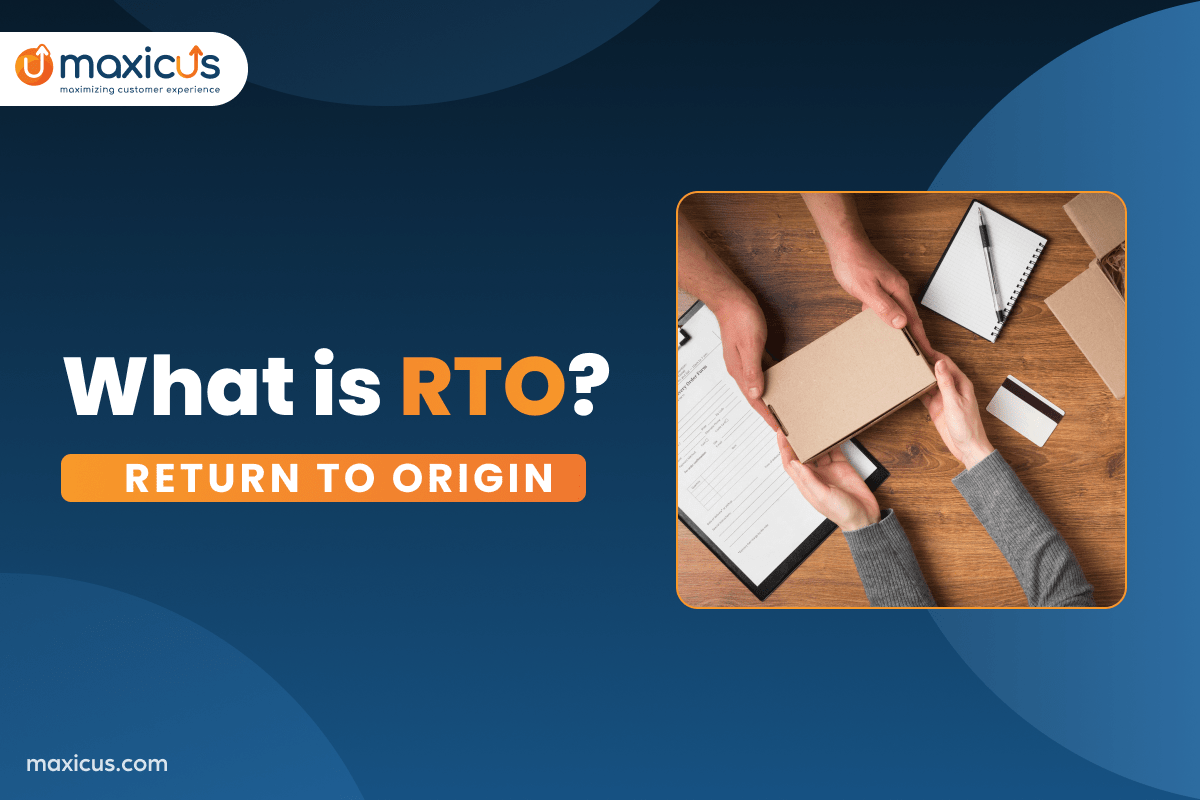What is RTO (Return to origin), and how do you reduce RTO in logistics?
In the fast-paced world of logistics, every step matters. But what happens when an order turns wrong and returns to where it started? This is the Return to Origin (RTO), a scenario where a shipment fails to reach its destination and is returned to the sender.
The Growth of Online Shopping and the Rise of RTO.
Recent estimates indicate that Online retail sales are expected to keep growing fast, with an estimated yearly increase of 14.6% from 2021 to 2028. So, online shopping is expected to continue growing rapidly.
But do you know what? More and more, failed deliveries are a growing problem.
Almost all stores (99%) admit to having some failed deliveries, and 24% say that more than 1 in 10 orders are less likely to deliver on the first attempt.
And what’s the reason behind this? Return to origin (RTO)
What is Return to Origin (RTO)

Return to origin (RTO) is a significant challenge, occurring when a shipper or courier opts to send items back to the seller rather than attempting delivery again.
Indeed, understanding the Return to Origin (RTO) concept is pivotal in addressing the challenges associated with failed deliveries in the online landscape. RTO, in its essence, occurs when a shipped item fails to reach its intended destination and is subsequently sent back to the initial shipping location. This phenomenon results from various factors, including logistical challenges and communication breakdowns throughout the delivery process.
Challenges in the Logistics Industry

Numerous challenges contribute to the prevalence of RTO (Return to Origin) in the ever-evolving world of logistics. These challenges include:
1. Lack of proactive update
In the logistics industry, the absence of real-time delivery updates leaves customers in the dark about their order status. This lack of proactive information leads to frustration and dissatisfaction among customers.
2. Delays in Returns
Untimely returns of undelivered items to the origin point pose a significant challenge, adversely impacting inventory management. These delays contribute to the overall problem of Returns to Origin (RTO).
3. Rescheduling Challenges
Frequent rescheduling of deliveries for various reasons introduces confusion and operational inefficiencies in logistics. The constant adjustments in schedules can disrupt the smooth flow of operations.
4. Package Loss in Transit
Loss of packages in transit is a dual challenge, incurring financial losses and actively contributing to the Return to Origin (RTO) problem. Addressing this issue is crucial for improving logistics operations’ overall efficiency and reliability.
5. Delivery Executive Coordination
Inefficient coordination among delivery executives leads to missed deliveries, causing subsequent returns. This coordination challenge further complicates the logistics process and necessitates streamlined communication and coordination mechanisms.
Strategies to Reduce RTO
Efficient logistics management is crucial to reducing RTO and enhancing overall customer satisfaction. Here are some strategies to address the challenges associated with RTO.
1. Real-time Tracking and Updates
Implement a robust tracking system for deliveries, providing customers with real-time updates. Proactive communication helps manage expectations and reduces uncertainty about delivery status.
2. Customer Engagement and Education
Educate customers on providing accurate address information and engage them through various channels to inform them about the delivery process.
3. Delivery Confirmation Services
To ensure packages reach the intended recipient, utilize delivery confirmation services, including calls or messages, addressing issues before delivery attempts.
4. Efficient Customer Support
Establish a responsive customer support system to handle order queries promptly, providing timely and accurate information to prevent unnecessary returns.
5. Omnichannel Support
Offer omnichannel support for order queries, enhancing accessibility and customer satisfaction through chat, call, and email channels.
6. Invest in Technology
Embrace technological solutions like route optimization and inventory management systems to enhance overall logistics efficiency and reduce the likelihood of RTO.
How Does RTO Impact Online Business?
A growing business has to incur the cost of logistics and order processing fees; however, what impacts them the most is when a product is returned to them because it adds additional costs.
1. Forward & Reverse Logistics cost
When a product is returned, businesses incur the initial shipping cost and bear the expense of returning the product. This dual logistics cost, involving both forward and reverse logistics, can significantly dent the profit margins of online businesses.
2. Blocked/Stuck Inventory
When a customer makes an online order, the specific product they choose becomes blocked. This blocking happens when someone orders the product until it returns to the inventory. Moreover, even after it’s back in stock, it stays stuck in the inventory if no one else orders that same product. This means the item is held up and unavailable for sale until someone buys it.
3. Operational Cost in Order Processing
Processing orders involves many steps, and dealing with returns requires more people, time, and resources. Dealing with returned products includes tasks like talking to customers and restocking items, all of which increase the overall cost of running the business. Simplifying return processes is crucial to keeping these extra costs under control.
4. Repackaging & Quality Checks
Once a product is returned, it may not be in the same condition as when it left the warehouse. Repackaging and conducting thorough quality checks are essential to ensure that the product meets the standards for resale. These additional steps in the post-return phase demand both time and financial resources.
Why outsource your logistics operations to Maxicus?
Maxicus stands out as a reliable partner regarding efficient logistics operations. Maxicus offers comprehensive outsourcing solutions that address the challenges associated with RTO. Their services include:
1. Omnichannel Support for Order-Related Queries
Maxicus is a dependable logistics outsourcing partner, offering comprehensive solutions for Return to Origin (RTO) challenges. With multichannel support via chat, call, and email, Maxicus ensures real-time customer assistance, minimizing the need for repeated inquiries and enhancing overall operational efficiency.
2. Delivery Confirmation Calling
Maxicus proactively approaches logistics operations by providing confirmation calls for successful deliveries. This strategic measure aims to achieve first-attempt success, significantly reducing the occurrence of Return to Origin (RTO) instances and enhancing the overall reliability of the delivery process.
3. Return Pick-up Confirmation Calling
Efficiency is key in the logistics landscape, and Maxicus addresses this by implementing streamlined confirmation calls for return pick-ups. This approach expedites the return process and ensures timely processing, ultimately minimizing the impact on inventory and contributing to a more agile supply chain.
4. Customs Clearance Calling
In the realm of international logistics, Maxicus plays a pivotal role in ensuring smooth customs clearance. The company actively manages and facilitates the customs clearance process through proactive confirmation calls, contributing to a seamless cross-border movement of goods and reducing the risk of delays and complications.
5. Coordination Between Logistics, Delivery Executives, and Customers
Maxicus takes logistics coordination to the next level by fostering enhanced communication among various stakeholders in the delivery process. By improving coordination between logistics, delivery executives, and customers, Maxicus significantly reduces the likelihood of missed deliveries and subsequent returns, thereby optimizing the overall logistics workflow.
Don’t let RTO slow you down
Conclusion
And there you have it – the ins and outs of RTO in logistics and how to cut down on the hassle.
To wrap it up, dealing with returns in logistics can be a headache, but Maxicus has your back. They offer tailored solutions to make logistics smoother and more efficient, ensuring that returns don’t slow you down. What’s more- Maxicus understands the financial impact of returns on businesses.
Maxicus is here to help by providing tailored solutions to make logistics smoother and more efficient. Don’t let RTO slow you down — get in touch with Maxicus today to simplify and improve your logistics. They’re all about making things easy and boosting your success in the logistics game.
By teaming up with them, you simplify logistics and cut down on return-related costs, ultimately boosting your success in the logistics game.
Don’t let returns be a hassle—connect with Maxicus today and take the first step towards a more straightforward and profitable logistics experience.










